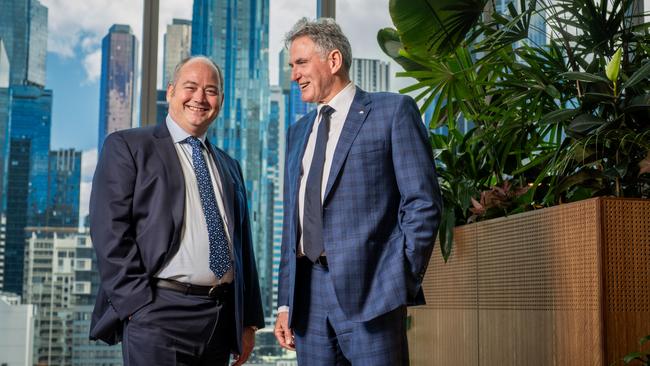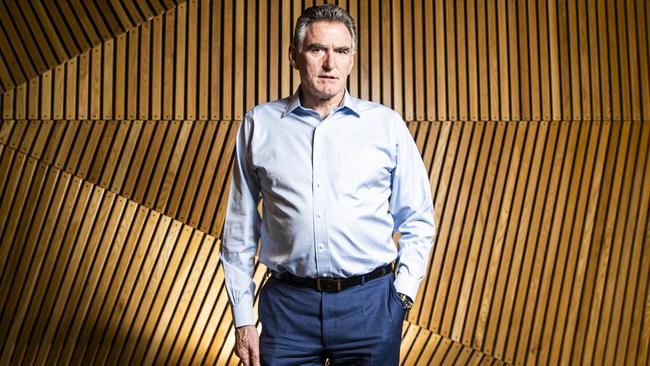With Ross McEwan retiring, new NAB chief Andrew Irvine eyes growth for bank
National Australia Bank’s new CEO Andrew Irvine has outlined plans to grow its retail banking and business deposit operations, as well as grab new customers in healthcare.

Business
Don't miss out on the headlines from Business. Followed categories will be added to My News.
National Australia Bank’s new CEO has outlined plans to grow its retail banking and business deposit operations, as well as grab new customers in healthcare, as he issued a caution not to talk down the national economy.
Andrew Irvine, who was appointed the successor to NAB’s four-year veteran Ross McEwan, said he intended to avoid “moonshot” bets but outlined plans to steadily grow the bank in coming years.
Mr Irvine, who will take on the top job at NAB on April 2, ahead of Mr McEwan’s retirement on July 1, has landed the role after outcompeting rivals within the bank after three years running its business and private wealth operations.
The Canadian-British businessman, who joined NAB during the pandemic after a stint at the Bank of Montreal, said Australia’s economy was well positioned to grow despite concerns of a spending slump amid higher interest rates and inflation.
Mr Irvine said 2024 had been a “more difficult period” for NAB’s customers, noting many businesses and borrowers were struggling, but he warned against doomsayers.
“The other thing I’d caution us to do is not talk the economy down,” he said.
“We’re still really optimistic about Australia, there are lots of companies out there looking to grow.”
Mr Irvine said most NAB customers had been able to work through higher interest rates, which have climbed from their pandemic lows of 0.1 per cent to 4.35 per cent.
The RBA moved to keep rates on hold at its February meeting, but left the door open to further cuts as well as increases.
“Australia and New Zealand are still among the very best places in the world to work through that,” Mr Irvine said.
Mr Irvine takes on a business squarely focused on Australia and New Zealand, as the biggest business lender in both countries as well as a major retail and mortgage player. But he said his immediate focus would be listening to NAB’s staff and remaining “relevant” to customers around Australia and New Zealand, indicating there would be no big changes or surprises.
“There’s not many big moon shots, all the time in this it’s about doing the basics really well,” he said. “We’re very much focused on continuing to do that better and better every day.”
Mr McEwan said NAB had done well by being “very clear about where we’re investing money”.
“I’ve been somewhat dogmatic about staying in the swim lanes, it’s worked well for us,” he said.
“The success for us has been staying focused. That’s the danger for banks. They start doing things outside those swim lanes and find they’re not as successful as they should have been.”

Mr McEwan said NAB’s attempts to fight off rivals gunning for its business lending market share showed the strength of the bank.
“I laugh about it. But it’s inevitable we will actually become the biggest deposit franchise in business banking,” he said. “We were never a deposit franchise and we’re really turning it around.”
But Mr McEwan’s exit surprised investors, who were attracted to his turnaround of Australia’s biggest business lender, with shares diving almost 1 per cent on the open on Wednesday to $31.80 – as rivals CBA, Westpac and ANZ saw positive trading – before closing just 0.3 per cent down at $32.10.
NAB shares have surged more than 112 per cent since their pandemic lows.
Mr McEwan, appointed to the top job at NAB in July 2019, is credited for stabilising the bank in the wake of a management exodus and searing findings by the Royal Commission into Misconduct in the Banking, Superannuation and Financial Services Industry.
Mr Irvine said NAB had done well from focusing on its customers, with the bank’s business lending arm the flagship business bank in Australia. “You can count on the fact we’re going to continue to try to look after our strong position,” he said.
But he flagged hopes NAB could continue to grow its personal banking franchise, as well as boost the bank’s business deposit base, which has historically lagged its lending levels.
“We’re the largest bank for farmers in Australia, but our market share in other areas, maybe pointing out things like healthcare, isn’t quite as high,” he said.
“We still see all sorts of opportunities to become more relevant and grow our franchise.”
NAB’s ownership of the HICAPS billing system gives the bank a key presence in healthcare.
Mr Irvine noted his surprise when first joining NAB at how much business lending was secured to property.
He said NAB was seeking to use data to guide its lending models to allow more lending to businesses without the need for property backing.
“You’ll see us continue to improve our capabilities,” he said.
–
‘We’re still really optimistic about Australia, there are lots of companies out there looking to grow’
Andrew Irvine, incoming NAB chief executive
–
Mr Irvine said he would also focus on fighting scams and fraud, saying they were something the bank was keen to work more on.
Mr Irvine will also take on the chair of the Australian Banking Association, which Mr McEwan currently holds on behalf of NAB, which took on the top role for two years in December.
ABA chair Anna Bligh said Mr McEwan “led the National Australia Bank out of some of its darkest days from the excoriating experience of the royal commission and straight into the Covid-19 pandemic”.
But the Finance Sector Union took aim at Mr McEwan, with national secretary Julia Angrisano saying he “maintained a policy of being short-staffed across the bank’s range of operations and consistently overworked employees”. She said: “Mr McEwan has ignored calls for a relaxation of the top-down pressure for staff to complete unreasonable amounts of work on a daily basis.”
The union leader also criticised Mr McEwan’s efforts to slash NAB branch numbers, calling for the bank to stop offshoring jobs.
NAB said Mr Irvine’s replacement to run the business and private banking arm, would be selected “in due course”, with Mr Irvine saying the bank had a “strong talent pool here”.
NAB chair Philip Chronican said Mr Irvine had the key strengths needed to support taking on the CEO role.
“The customer is front and centre for Andrew,” he said.
Mr Chronican, who took on the chair in late 2019 in the wake of the royal commission, said Mr Irvine had created significant benefits for NAB due to his “expertise in digitisation, transformation and modernising”.
But Mr Chronican paid tribute to Mr McEwan, who he said had built momentum at NAB despite also being charged with cleaning up the bank’s messy structure in the wake of the royal commission.
Mr McEwan’s exit comes in the wake of Angela Mentis’s retirement in October last year, taking out a key rival for Mr Irvine for the top job.
Ms Mentis had run NAB’s New Zealand business, as well as previously taking a leading role in the business arm.
Citi analyst Brendan Sproules said NAB had “demonstrated to its peers how to achieve a successful leadership transition”, but said Mr McEwan “had the strongest support out of any bank CEOs from the investor base”.
“Given NAB has achieved a strong rerating in recent years from its strong execution and transparency, the bar has been set very high for Mr Irvine,” he said.
JPMorgan analyst Andrew Triggs said changes to NAB’s earnings outlook on the back of the leadership change was “a low probability”, but said the bank may seek to make more investments given that its spend was lower than that of peers.
“Ross McEwan always put this down to less wastage/greater focus,” Mr Triggs said.
“This approach may not necessarily change, but a fresh pair of eyes may identify areas for investment prioritisation.”
Pengana senior fund manager Rhett Kessler said Mr McEwan had changed the culture at NAB.
“When stuff needs to be done he’s cut through a lot of the bureaucracy and focused on real banking,” he said.
More Coverage
Originally published as With Ross McEwan retiring, new NAB chief Andrew Irvine eyes growth for bank





